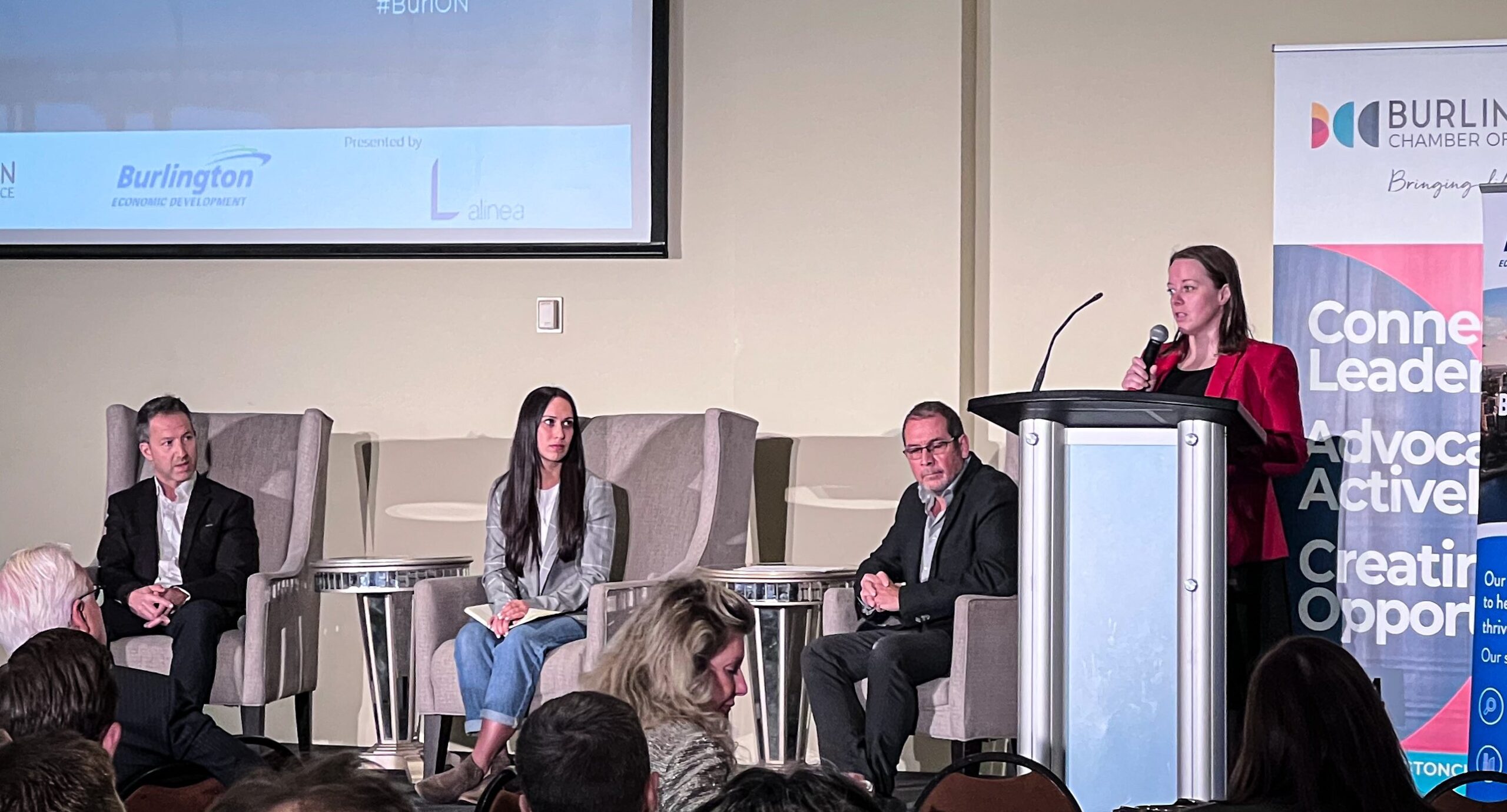“Business without boundaries” was the theme at last week’s Red Tape Reduction Symposium, hosted by the Burlington Chamber of Commerce at the Burlington Convention Centre. The event, which included keynote speaker, the Honourable Parm Gill, the provincial Minister of Red Tape Reduction, brought together a crowd with diverse backgrounds, all interested in the reduction of red tape that has halted growth in the city. Challenges to growth include development proposals that have come to a standstill, outdated regulations, and delayed permits, among others.
There are many stakeholders who have encountered these challenges of conducting business in the City of Burlington and other municipalities across the province. In fact, these challenges led to the creation of the Less Red Tape, Stronger Economy Act by the Ontario government, which introduces 29 new measures that aim to help businesses and not-for-profits save in regulatory compliance costs while improving services to Ontarians. This Act, according to the province’s news release, will look to improve the delivery of high-speed internet access to every community by 2025, improve health and safety regulations in the mining industry, enable carbon storage innovation technology, implement the Hague Convention on International Recovery of Child Support in an effort to enforce support orders in over 55 countries, and improve Ontario’s roads by updating the Highway Traffic Act.
According to Gill, the province uses key metrics to evaluate the annual cost savings for a business as a result of red tape reduction, which is calculated twice a year. During the course of a four-year term, the province set a goal of approximately $400 million in net annual compliance cost savings. Last year, the goal was far exceeded, achieving $576 million in savings for businesses across the province. In 2023 so far, nearly $700 million has been achieved in net compliance cost savings, and Gill went on to clarify that these are not one-time cost savings, but rather savings that continue annually for businesses.

A panel discussion was also presented, moderated by Anita Cassidy of the Burlington Economic Development Corporation. Panelists included Josie Tavares of CLV Group Developments Inc., Burlington’s Ward 1 Councillor Kelvin Galbraith, and Nickel Brook Brewing Co.’s John Romano. These panelists, given their diverse backgrounds, brought forward unique perspectives and experiences that they have personally encountered while operating or supporting a business. Notably, each shared how much more difficult it has become to conduct business over the years, and that all levels of government need to embark on a joint venture to ensure growth is viable in meaningful ways.
Romano, for example, opened Nickel Brook on Drury Lane almost 30 years ago with a drawing he drew himself. He submitted the building permit application in January of 1992, and by May/June of the same year, he opened his doors. Now, move forward to the relocation from Drury Lane to Mainway, and according to Romano, the changes in paperwork, red tape, and process itself have intensified. As a result of this complex process, Romano found himself hiring a professional engineer who has worked in the region for years, and a former employee of the City of Burlington who worked in the building department to help push through these complexities in a timely fashion. He acknowledges that the pandemic did not aid the process, but as a business owner, it can be discouraging to conduct business in the city.
Tavares, who works for CLV Group Developments Inc., has a big project here in Burlington — the former Holland Park site on Fairview Street. This upcoming development will bring seven towers to the former nursery location, ranging from 29 to 37 storeys, with approximately 2500 residential units in total. Arguably a complex-sounding site, but likely an ideal location given its proximity to the GO train station. A challenge she has continued to encounter is one that involves time. Every single process, project, or technicality has taken so much time to complete — more than one could imagine. From the initial submission of the application to the circulation of the application, and then receiving back the comments and revisions required for the application’s approval, there has been a lot of red tape, according to Tavares.
The city’s engineering department has been one that has proven to be challenging to work with, and Tavares shares an example of one particular application that took nine months to get the comments back from the department, and when they were finally presented back, the comments issued were 47 pages in length, the most Tavares has ever received. Many comments were repetitive or stated that key materials were missing, but Tavares argues that had the application been reviewed properly and thoroughly, many of these comments could have been eliminated. Many comments and questions were also issued on stamped reports, provided by professionals — stamps that would not have been issued if the reports were inaccurate. In her personal experience, they are already hitting the one-year mark on this particular project, and the applications have yet to be circulated to the external agencies for review. During a time of a housing crisis, one can certainly empathize with her frustrations. The process evidently takes too long, leaving far too many impacted by the red tape and subsequent delays.
Galbraith, who opened his fitness business in 1998 in the Aldershot community, echoed the same sentiments that Romano did, not recalling the challenges being faced today. As a business owner, he acknowledged that the ability to pivot and adjust offerings based on market fluctuations has become a critical part of running a successful business, while also juggling the demands of any red tape that is presented along the way. He shared an example of exploring the addition of a smoothie bar in the gym, which was a trend that came into the market approximately ten years ago. He soon realized that there would be many moving pieces to address in order for this smoothie bar to happen. Changes to existing business licenses, health department inspections, food handling regulations, and so on, made this endeavour take much longer than originally anticipated. Once this smoothie bar was operational, the pandemic and ongoing regulation changes, made Galbraith and his team realize that the sales volume required to make the smoothie bar worthwhile was too high; it was no longer serving the needs of the business. Thus, the ability to pivot quickly was sought after.
Galbraith, who serves as the deputy mayor for business and red tape reduction, looks to work with the business community in Burlington to make conducting business more efficient and effective. Issues of timelines and red tape were at the forefront of concerned businesses, and as a result, 22 recommendations were presented to improve the processes at the city level for businesses to continue to thrive. Additionally, major investments continue to be made, both from a staffing perspective and digitally, including a new online portal to follow the application and permit process.
A notable takeaway came from Tavares, who believes that real estate/business developers and municipalities should consider their professional relationships as partnerships, working together towards a common goal. She went on to use Ottawa as an example, which views each development as unique, and each site requires a tailored solution where it makes sense. Simply put, blanket solutions don’t always work, and emphasizing increased communication and a common-sensical approach will help foster these professional relationships.




